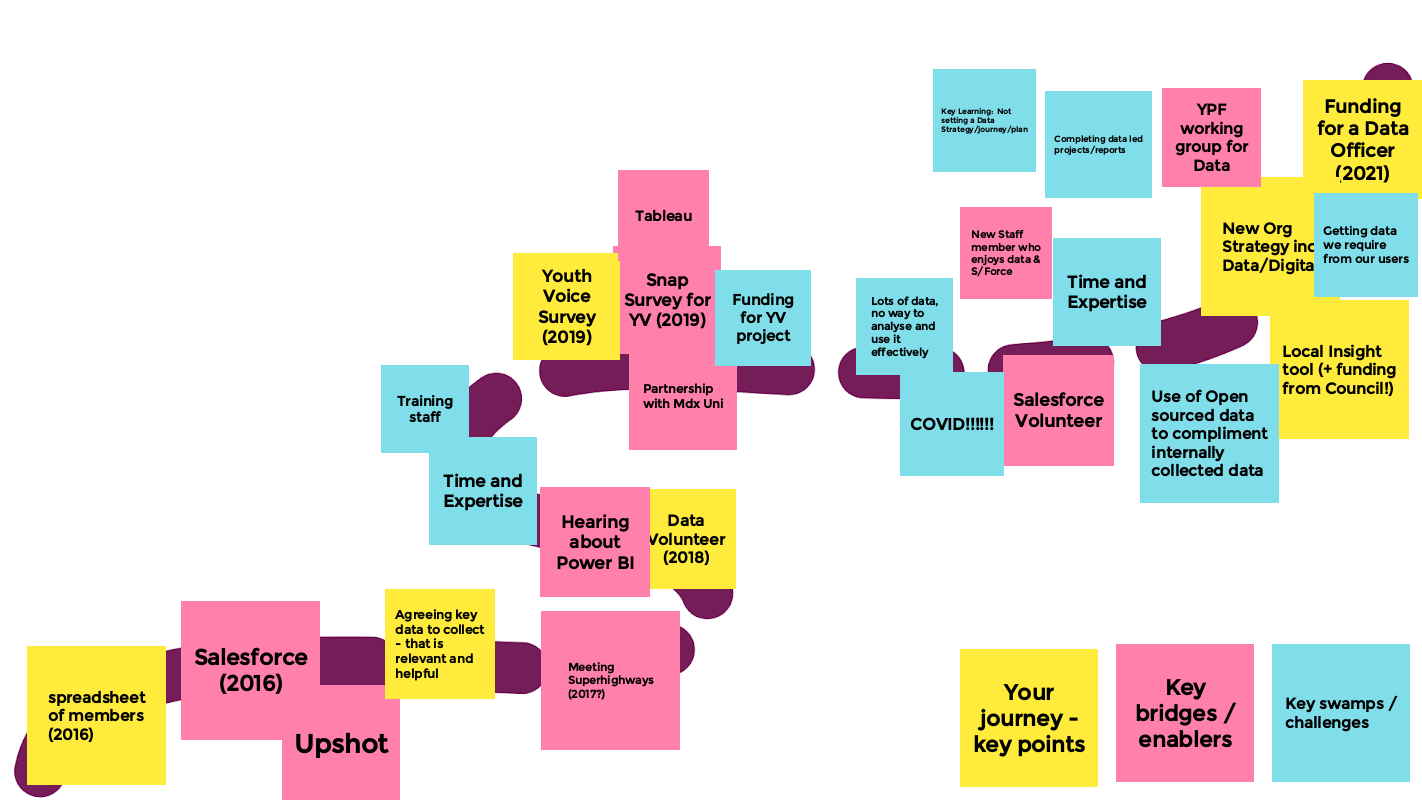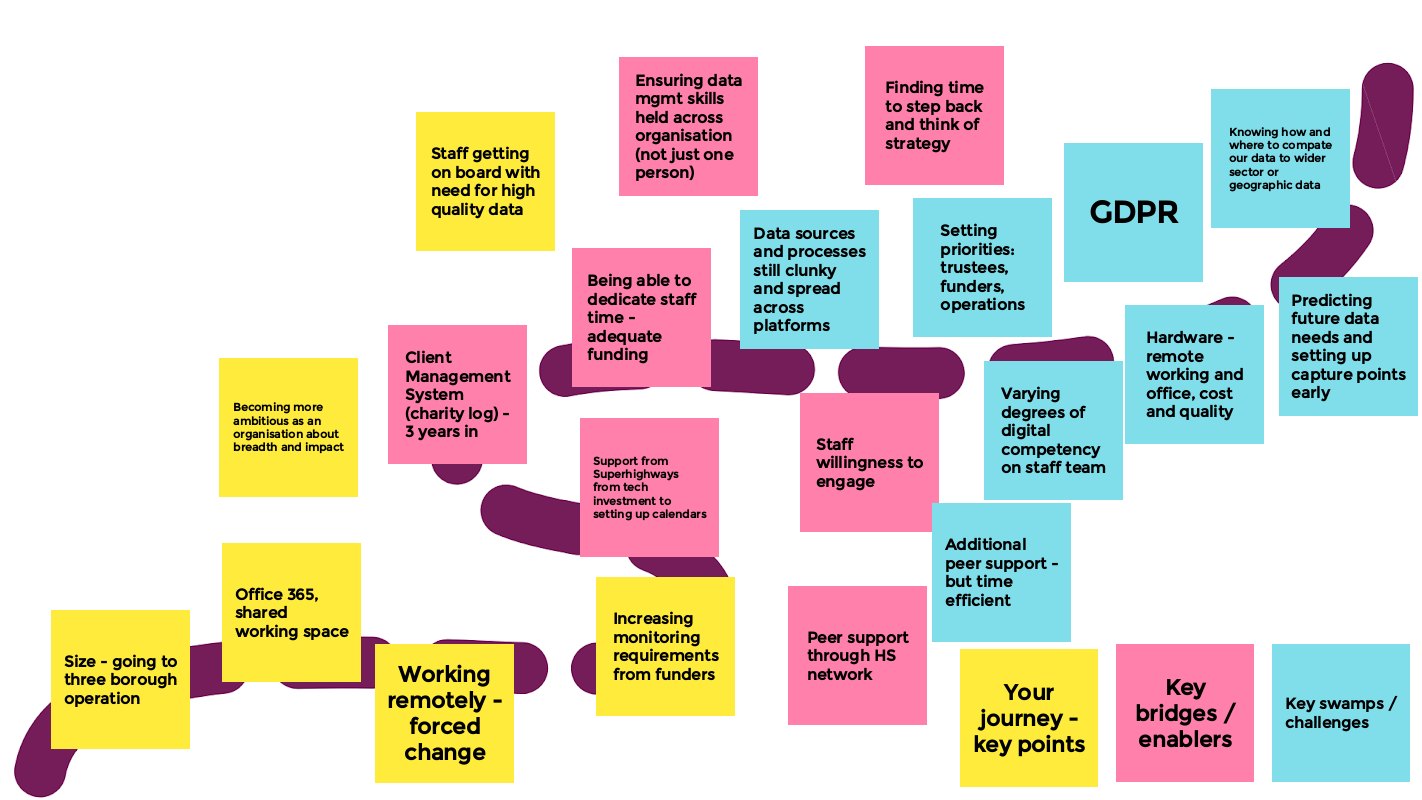Small charity data journeys
The Superhighways team worked with Nissa Ramsay from Think Social Tech to explore small charity data journeys. This blog post shares findings from initial research, as part of the developent phase for a Cornerstone Round 2 project.
Datawise London is a partnership programme of training, advice and support to help small charities and community organisations in London better use data to meet the needs of Londoners. This includes the taster Data Essentials sessions along with follow-on beginner and advanced training, ranging from how to use Excel, to practical short courses covering data collection, analysis, presentation and more. Sessions have been developed and delivered by Superhighways and Datawise London Partners.
This year we ran an 8 month long cohort programme which 6 small charities completed. It involved monthly sessions, consisting of technical skill building, organisational data culture and collaborative peer learning workshops, as well as access to training. To help participants monitor their progress, we worked with Data Orchard to offer participants the chance to use their Data Maturity Assessment tool. This helps gauge where an organisation is on their data maturity journey, benchmarks against others in the sector, and identify areas for improvement. We found that organisations significantly improved their data skills, tools and data use (three of the seven areas of data maturity), but also continued to face a number of challenges.
As we embark on the next year of our programme, we wanted to think more about data journeys and what support is needed most at each stage of data maturity (as described in the Data Orchard Data Maturity Framework). Taking inspiration from Catalyst digital journeys we started thinking about common paths organisations take, as well as challenges and enabling factors, as they start using data to shape their services and influence change. In October 2021, we hosted a peer learning workshop to test what these might be.
A peer-learning data journeys workshop
We brought together 8 small frontline and infrastructure organisations from across London who'd accessed the Datawise London programme to share their data journeys and experiences with one another.
These organisations had between 2 and 25 (not FTE) staff, with some involving networks of other organisations and many volunteers in delivery of services. In terms of annual turnover, their income ranged from £301k to £917k.
We offered participants compensation for their time to attend the workshop, having built in a co-design budget with expenses for organisations to participate in workshops, to help us shape future support.
The workshop involved participants mapping their data journey, using different colour post-it notes on a Google jamboard. We asked them to think about:
- How did you get to where you are now with your use of data? What were the key moments in your journey?
- What were the bridges that helped you overcome challenges? What enabled you to progress?
- What were the swamps?! What traps did you fall into? What obstacles did you find on the way?
We then asked participants to share their experiences in small groups. We asked them to discuss where they are now, what they are working on, their current challenges and what they want to be different. We recorded the workshop and transcribed the discussions and journey maps. We looked at each journey individually and together, using a process of thematic analysis. This generated a wealth of material on common drivers, barriers, challenging and enabling factors. We also found that during the workshop, participants felt able to reflect on their progress and achievements. They were able to recognise that their frustrations and challenges were shared experiences and not specific to them or their organisation. As a result, both they and the facilitators gained a better understanding of their data journey.
I think being able to just map everything out, it was nice to reflect back and be like, Oh, yeah, this is what I've done. We were at this point when we first started and where we ended, it was a nice reflective experience for sure.
Some example data journey Jamboards 
Key elements of data journeys
They start with funding
In all of the journeys described, funding had played a key role in kick starting their data journey. For some, their organisation needed better data about the impact of their work to bolster fundraising efforts. For others, funders required them to collect data to better report on what they had delivered and what difference this had made.
Interestingly, no one spoke about this as a particularly bad thing. It was simply where they focused their energy and the key reason why they started to develop their data, skills, tools and analysis.
I suppose my main motivation came from the requirement to produce quarterly monitoring reports for our funders. That was the initial motivation. But it was only when I started to do that on a quarterly basis that I started to build up a kind of a pattern on that data. And then that made me realise the real motivation should be to understand if we are providing the sort of service that the clients want. You can do that by using the data that we collect, but also the lack of data was clear… So the initial kind of motivation has changed, from reporting on data to are we making the most use of the data?
However, funding needs did not push them far in their data journey. Some noted that once they were happy with the data they were collecting, momentum paused. They were not using their data to full effect in their work and the organisation was not using data strategically to inform decision making or further exploration. They could see they could move beyond supporting and evidencing what their organisation already knew, to using data to shape services and influence change. It was up to them to drive a change in data culture and to enable the organisation to be more strategic in the use of data.
The organisation needs someone to lead on data
The workshop participants reflected that their role, approach and experience was largely inseparable from the organisation’s data journey. Some were in a dedicated data role, whilst others were leading on data in addition to, or as part of their main role. In either case, they were the crucial factor in enabling the organisation to progress with their data capacity.
It's my journey, but also the organisation's journey really.
They did this by implementing better or new processes, policies, tools and practices which could tackle specific data problems the organisation faced. Examples given included: finding a way to combine data collected in lots of different spreadsheets; understanding how a database worked in order to extract data from it; moving from paper based to online forms; creating a shared data collection tool across a range of remote workers.
It was clear that someone could step into this role in addition to their main work. However, it looked as though organisations could only advance with data capacity one someone was dedicated to this role.
Someone leading on data looks for practical training
In the workshop, all of the participants described how they had needed to upskill themselves. Most had sought out practical training in Microsoft Excel at beginner, intermediate and advanced level in order to start improving their use and analysis or data. They needed to learn how to join data sets, formulas and pivot tables.
The workshop participants also emphasised that investing time and money into learning and implementing new tools was not a one off activity, but an ongoing process. For some, this helped them see the need to invest in different tools, such as a new CRM such as Salesforce or visualisation tools such as Power BI. Training was helpful for seeing what was possible with their current set up as well as the limitations. Participants noted that it was particularly helpful to understand what else exists and what else might be possible.
I needed to understand how the database worked in order to be able to pull out the appropriate information. Once I'd done that, I was aware that I knew quite a bit about Excel, but needed some training on that. And this is where Datawise London came in, offering some brilliant training courses on Excel. That then made me look at their courses in Power BI and I realise now that Excel is history. You don't use Excel and Power Pivot Tables now to produce insightful data. Because you can pull it in basically just one place and you can pull in all the data, you can manipulate it, and then you can present it. So that's quite powerful data in one way. And you can cut it and slice it to provide the details that you want.
Investing in data tools is vital to the journey
Data tools were discussed a lot in the session. They clearly played a vital role in the data journey. These tools enabled organisations to produce and use data in a way which better shaped their services or strategy. Examples given included moving from an old database (such as Microsoft Access) to a new one (such as Salesforce and Upshot), making the most of excel or implementing new analysis tools (such as Tableau or Power BI).
I think most of the key enablers along the way in general were quite often tools that we've come across and started using.
However, three key barriers emerged at this point. Once basic data could be produced it was hard to move forwards.
The cost of tools could be prohibitive, whether it is a £1,000 licence or a £60,000 overhaul of an internal CRM. These are unlikely to be costs that have been planned for and the unrestricted funds may not be available. There was a fear of making the wrong decision over which tool to invest in and whether it is the right decision for their organisation. And a third barrier emerged if there was a lack of support at CEO and trustee level. They needed to sign off the additional costs or fundraise for them. A lack of knowledge or belief in the value of data at leadership level prevented some from moving forwards.
There's so many options out there. How do you strategically decide, well, this is the best way to go and then drive that with evidence. But there's not much out there that you need someone with the knowledge who can say there's X, Y and Z that will do the job. But for you, or your organisation, Z would be the better option, because of X, Y and Z. And again, the evidence to actually back that up.
Data protection, GDPR and statutory requirements
For three of the organisations in the workshop, data protection was a significant hurdle in their journey. Statutory and NHS funding bring requirements to have certain policies and procedures in place. Two also discussed having moved to a new system three years ago, they needed to anonymise data. They felt that there was a significant conflict and challenge here in balancing the need to adhere to legislation with other data priorities, such as reporting on client outcomes for funders. They had all found external guidance and shared practice with other charities in order to overcome this. However, they also noted the significant cost and resource implications involved, as well as the fear of getting it wrong.
After six years, we're going to have to start anonymising records of clients. That's going to be scary to do. You know, it's a big resource. It's about how you keep what might be important. So I cannot keep the advice we gave to a client on the system fully, but I can keep the record to say a client had an interaction with the service. So it's learning what we have to anonymise and what we can keep to kind of maintain meaningful data as well.
These practices as well are expensive and we don't have that money. So for example, one thing we have to do is be able to wipe data remotely. You've got to make sure you have a server that's strong enough to update, which is going to cost you a lot of money, then you've got to get all those systems of phones and laptops onto it. And then you've got to get the software to be able to wipe it remotely. These are all great things that you can say, in theory, but when you're telling small charities to do these kinds of things, where does the money come from?
Influencing change internally
Some participants spoke about the challenge of needing to improve the data culture in their organisations. They had initially focused on data in terms of specific tools or uses but started to see data as everyone’s responsibility, rather than one person's role or area of interest and expertise. They wanted to ensure staff could see the value of their work and the time they spent on data collection. They also wanted to encourage their organisation to use data more strategically and spent time with leaders and trustees exploring their data.
Storytelling was a key theme here, as were specific tools to enable this. Examples included helping staff see the impact of their work or providing a dashboard that everyone could use to explore data. They noted a shift in the skills they needed and the challenge of balancing their technical and operational role with that of culture and strategy. Some were struggling to determine how to move forwards. It is not clear at this point whether support has been, or could be helpful.
How do I start to instigate change, but also bring everyone on board? Because we have so many frontline staff and volunteers collecting and inputting data as part of their service delivery. How do I build that culture where they realise that what they put in is so important to the database about our clients, because there's so much information we get from that, and also for the organisation to think strategically. We've got all of this incredible data, how do we use it to inform what we do, and improve our service delivery? So kind of trying to do both strategic and operational stuff at the same time has been a challenge.
Staying motivated
The journeys described in the workshop highlighted how the role of the person leading on data shifts and evolves. The workshop participants explained how they were often the only person either interested in or working on data, making their role lonely and isolating. Change takes time and progress often feels limited. Peer support looked to be particularly helpful throughout the journey as a result. Participants reflected on the value of opportunities to share their experiences (in the workshop and in previous training sessions). In doing so, they could see they were not alone in the challenges they faced, learn how others approach it and see that they were making some progress. This helped their own motivation as well as helping them identify what they could do next to move forwards.
The ability to check in with people in similar situations is really quite nice and helps when you feel isolated on data to to just feel part of a journey. So we’re really keen to learn and bounce off each other. Thank you for today's session. I'm smiling again.
Summary and next steps
Overall, the workshop drew attention to a number of shared challenges and experiences. Funders and funding clearly have a strong influence, but it’s not clear if this affects the overall journey positively or negatively. There also looks to be a natural progression through specific tools and an increasing focus on data protection and legislation. Both have a significant cost and resource implication, both of which are hard for small charities to resource or justify resourcing amidst their other priorities. Practical training and peer support have played a vital role throughout for this group. We believe there is more to learn from the journeys charities take and we hope that this will help us to better understand:
- Are there common data journeys for small charities (and are there any distinct differences or types of journey)?
- How can we best support organisations at the start of their journey, as well as those who are further along?
- Are there any other external factors (such as funding) shaping or hindering their journey (and could we intervene)?
We have built in costs for further community research into the data journeys of small charities, including two more roundtable events and follow up interviews, and hope to be able to start this work in early 2022.

